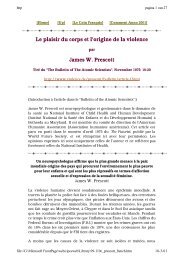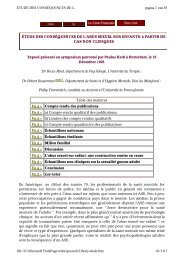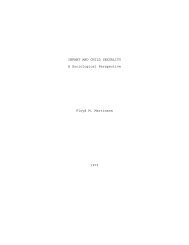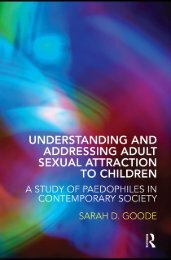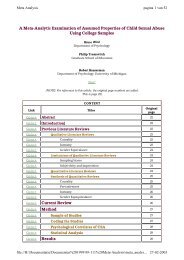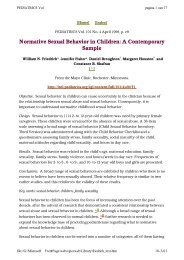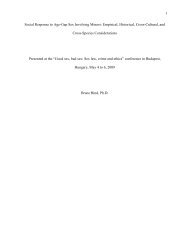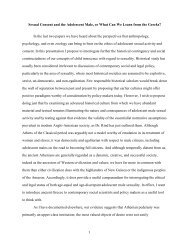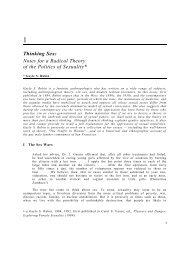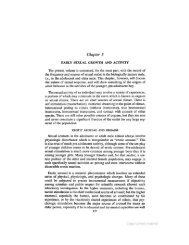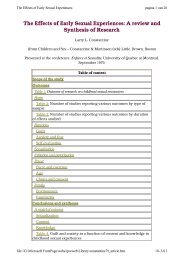PDF file - Ipce
PDF file - Ipce
PDF file - Ipce
You also want an ePaper? Increase the reach of your titles
YUMPU automatically turns print PDFs into web optimized ePapers that Google loves.
Part_5_2<br />
Randy also made a further, very perceptive, observation. He wrote: "The real danger is if the<br />
relationship were discovered and reported. It has been said that it is not the relationships that<br />
cause trauma but the reaction of the authorities. I keep hoping that the children will remember the<br />
quality of the relationship despite what they are told. If this is not possible, it would be better to<br />
never have any kind of relationship with a child because even Platonic relationships can invoke<br />
suspicion and the child could be convinced that we have ulterior motives. So the question<br />
remains: do we deprive ourselves and the children of the potential benefits of a positive<br />
relationship or talk to them about the possible risks, let them make a choice, and then enjoy<br />
each other's company?"<br />
Randy's comment here once again takes us back to what is lacking in the principles: any<br />
statement of a positive goal, the benefits, not just the pitfalls: what good are we seeking; what<br />
good can we do. In his discussion of the Four Principles in his paper entitled I didn't know how<br />
to deal with it, Frans sees the possibility of doing good in non-sexual contacts with youngsters.<br />
So do I. In the right circumstances. But Randy is on strong ground when he points out that<br />
even such contacts may not be very positive, or may even be downright negative in their<br />
impact if they are hedged about with suspicion. Nor is suspicion of the adult the only problem.<br />
Platonic love<br />
The whole idea of Platonic love is in my view deeply suspect in itself. The phrase is generally<br />
taken to mean love which is too pure to be sullied with a bodily expression. Putting a high<br />
value on so-called pure love in this way inevitably reinforces the idea that sex is dirty and<br />
degrading, so actually leading us away from, not towards, the original goals of our ethical<br />
system, had we bothered to make such goals explicit. Incidentally, so far as I can tell from my<br />
limited researches, the idea of so-called Platonic love finds very little clear expression in the<br />
writings of Plato himself. The supposed anti-sexual element in Plato, derived from his theory of<br />
forms, was played up out of proportion by Mediaeval theologians who were trying to reconcile<br />
ancient philosophy with the strictures of the Christian church.<br />
So, although a Platonic relationship may - with luck - appear "respectable" and be accepted in<br />
society, and may enable he who exercises the required saintly restraint to feel a good<br />
conscience, the messages such restraint sends out to the youngster are likely to be damagingly<br />
negative where sex is concerned.<br />
In this regard, I would remind everyone of John Money's writings describing the often tragic<br />
consequences of love and lust being separated: tragic especially in terms of producing a guilty,<br />
furtive attitude to sexual desire, particularly to forms of sexual expression such as<br />
homosexuality and masturbation which do not fit the traditional, socially approved aim of<br />
reproduction within marriage. The problem is less acute these days, perhaps, than in Money's<br />
heyday. Nowadays, for adults, pretty well anything goes except paedophilia. But that seldom<br />
applies to schoolkids just discovering that they are gay. Their introduction to being gay is still<br />
http://home.wanadoo.nl/ipce/newsletters/nl_e_12/part_5_2.htm (7 of 13) [10/16/2002 5:35:14 PM]



